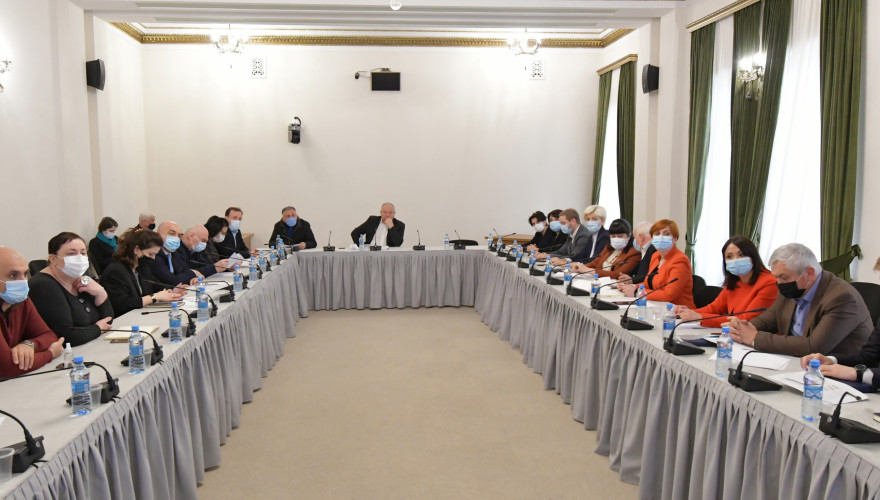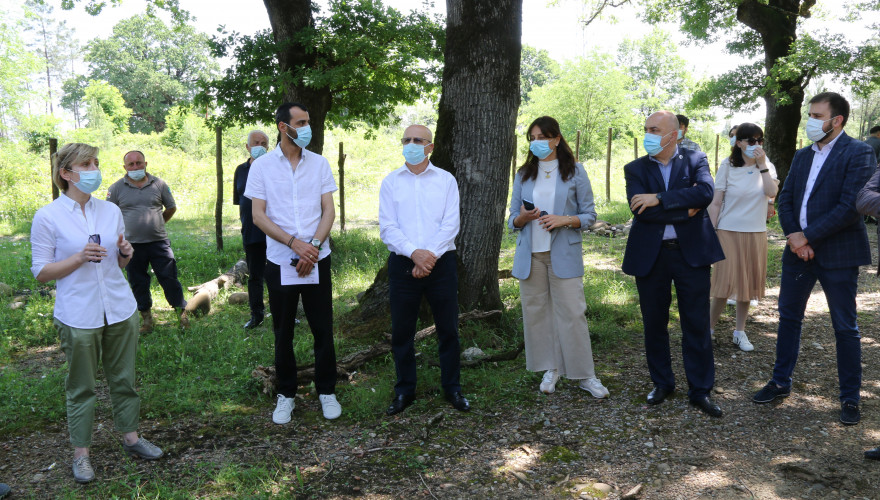Sitting of Standing Audit Group on State Audit Service Reports

The Audit Group, presided by the Chair, Paata Kvizhinadze, discussed three reports submitted by the State Audit Office: Compliance Audit for 2015-2017 of Academician Nikoloz Kipshidze Central University Clinic; Efficiency Audit of Tuberculosis Prevention and Treatment; Compliance Audit for 2017-2018 of State Program for the Provision of Medicines for the Treatment of Chronic Diseases.
The Issues were reported on by the Head of the Economic Activities Audit Department at State Audit Office, Tornike Shermadini, Head of the Performance Audit Department, Giorgi Kapanadze and the Head of the Social Audit Department, Zaza Shekiladze.
Representatives of the Ministry of Health, Deputy Auditor General, David Gogichaishvili and Deputy Minister of Health, Tamar Gabunia also participated in the sitting.
"I would like to draw your attention to the Efficiency Audit related to the prevention and treatment of tuberculosis, which is an international parallel audit and was conducted with the assistance of GIZ in Georgia, Ukraine and Azerbaijan. Our service, being the leader among these countries, has played a crucial role in the audit process. This achievement with the active assistance and involvement of the Parliament once again underscores the high institutional capacity of the Audit Office”, - the Deputy Auditor General stated.
T. Shermadini introduced the results of the Compliance Audit of the Academician Nikoloz Kipshidze Central University Clinic and noted the audit covered the years 2015-2017 and has been mainly concerned with the area of public procurement, measures taken under the Hepatitis C Management State Program, as well as universal insurance and accounts receivable management. A total of 7 recommendations were issued.
T. Gabunia elucidated on the results of the audit and said that after the reporting period, the management model of the clinic has completely changed, the recommendations are all relevant and they will definitely be taken into account.
According to the MPs, the audit revealed serious violations in the clinic in 2015-2017 and it is important that the relevant authorities take an interest in this matter.
Pursuant to G. Kapanadze, who introduced the Efficiency Audit Report, this process was accomplished last year along with several countries from the Eastern Partnership bloc.
As part of the audit, the State Audit Office examined the proper functioning of TB prevention mechanisms and the effectiveness of existing support mechanisms for the treatment of TB patients.
According to the rapporteur, Georgia, compared to EU countries, has a high prevalence of tuberculosis, although an important achievement for the country is the downward trend in the spread of the disease, as well as the number of new cases. Nevertheless, the study revealed some shortcomings in terms of both preventive and supportive mechanisms of treatment. A total of 6 recommendations were issued on the shortcomings identified by the State Audit Office.
Introducing the Compliance Audit for 2017-2018 of State Program for the Provision of Medicines for the Treatment of Chronic Diseases, Z. Shekiladze noted that a total of 5 recommendations were issued on the shortcomings identified by the State Audit Office. He introduced the findings and recommendations identified by the Audit Service during the implementation of the state program.
The issues, among others, concerned the procurement of medicines, expenditure, program evaluation indicators, weaknesses in internal control. The audit revealed that the volume of medicines did not take into account the low referral of beneficiaries and the number of medicines purchased was higher than its consumption, which led to the creation of non-optimal supplies and increased the risk of irrational spending of budget funds. As the First Deputy Minister explained, taking all this into account, the Ministry decided to fundamentally change the implementation mechanism of the program, which protects the state from financial risks.
The Standing Audit Group will continue to hear the audit reports performed by the State Audit Office in various agencies and departments in the future.





